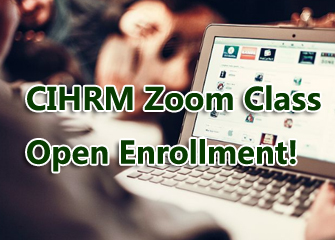Certifications


Home
>
Certifications
>
Certified International Professional Manager (C.I.P.M. Level 2)
Certified International Professional Manager (C.I.P.M. Level 2)
Introduction
Globalization represents a revolutionary integration of capital, technology and information across national boarders in a way that is creating a single global market and, to some degree, a global village. While globalization is of greatest concern to businesses and agencies working transnationally, globalization trends affect all businesses whether or not they are truly global. The International Manager certifications are designed for the sophisticated manager with extensive work experience seeking advanced instruction in issues related to globalization. The program provides the specialized knowledge and skills necessary to manage successfully in a rapidly changing, multicultural and multinational environment.
The certification program has three major objectives. They are:
1. To provide sound knowledge of globalization concepts from the perspective of all business management disciplines
2. To provide skills related to working effectively in the multicultural, multinational, business world that globalization is creating.
3. To provide an opportunity for making a contribution to the globalization knowledge base through completion of the required doctoral project.
Candidates in this certification program are expected to be highly motivated, disciplined, self-starters.
The unique delivery modality allows this program to be offered on-site at any company or governmental agency that wishes to bring the program directly to its employees. In addition, the program can be given online, using Blackboard or another online learning courseware. These delivery modes can increase student and company convenience by reducing travel time, missed work hours and incidental costs that normally accrue to students.
This Certification Program is a core certification program of the American Certification Institute. This program offers the designation of C.I.P.M. (Certified International Professional Manager) to candidates who demonstrate their understanding of the fundamentals of the profession through the successful completion of rigorous professional certification examinations based upon the INTERNATIONAL PROFESSIONAL MANAGEMENT BODY OF KNOWLEDGE (IPMBOK).
Modules for Certification
Module 1 Global Management
International management practices are discussed including: the use of teams, employee recognition practices, and the shifting role of the middle manager and management development programs. The module builds a model of the effective manager in an international context with particular emphasis on identifying and developing key competencies. The challenges in selecting and developing effective expatriate managers are also examined.
Module 2 Managing Across Cultures
This module focuses on the skills necessary for managers to deal with cross-cultural issues in international business and government. Specific management competencies are reviewed. Emphasis is placed on cultural aspects of verbal and non-verbal communication as well as on cultural expectations about management from those in management roles as well as those who are managed by them. Multicultural team building, overcoming cultural bias and other challenges of cross-cultural management are also examined.
Module 3 Leadership in a Global Context
Leadership has been traditionally been defined as establishing a future vision and influencing others to achieve that vision. This module tests this view against the requirements of international and cross-cultural business. Alternative models of leadership are proposed and discussed. The module also provides a “hands-on” interpersonal experience to give each student the opportunity to assess and be assessed in situations that call for leadership.
Module 4 Negotiating Across Cultures
Negotiating skills are critical to success in today’s globalized work environment. This skill-building course provides participants with models and practices of effective negotiating. Cross-cultural and international negotiations are covered in detail.
Module 5 International Human Resource Management
This module addresses core human resource (HR) management areas such as staffing, training, compensation, and labor relations in the context of doing business on a global scale. Trends in HR management are explored, especially in the international context. The requirements for effective HR management to create ultimate success of the enterprise are examined.
Module 6 Business Strategy from a Global Perspective
This module explores the development, application and execution of business strategy while taking globalization into account. Globalization is not taken simply as an external force impacting company strategy but as a requirement for reformulating strategy and the entire strategy making process. Students are given the opportunity to apply strategic planning tools and techniques to an area of their own choosing.
Examination
Exam questions are multiple choice. The multiple choice examinations include questions relating to definitions, understandings of concepts, discussion of the relative merits of various issues, as well as development of approaches to hypothetical situations. A list of sample questions is available from the American Certification Institute.
Professional Designations
Successful candidates are granted the designation of C.I.P.M.. The designation C.I.P.M. may be used just as similar recognitions are employed in accounting, insurance, medicine, law, and other professions. Either the full expression or the initials may be used after the individual's name on business cards, stationery, etc.






 1-302-570-0886
1-302-570-0886  admin@amcertinst.org
admin@amcertinst.org



